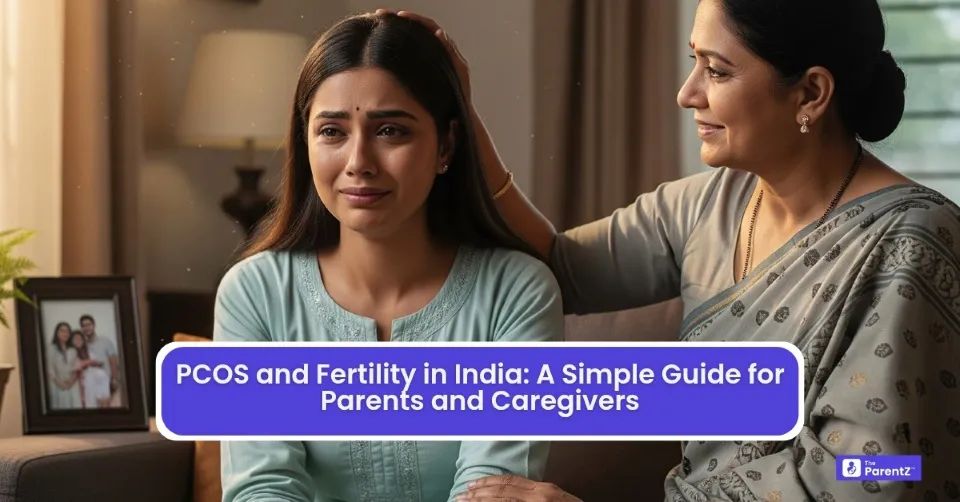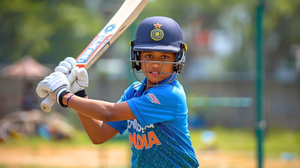The topic of PCOS and fertility in India is gaining more attention lately. As lifestyles change with more processed foods and stressful lives, PCOS rates are increasing. But remember, having PCOS doesn't mean that becoming a mother is impossible. There’s still hope and support available.
If your daughter or a loved one is going through PCOS, then this is a must-read for you. Let's talk about PCOS in simple terms, so you can better understand this condition and learn how to support your family members through this journey.
Understanding PCOS in Today's India
PCOS is becoming increasingly common across Indian cities and towns. Our lifestyle changes over the past few decades have played a significant role. Increased stress levels, irregular sleep patterns, and reduced physical activity have all contributed to rising PCOS rates.
However, here's the most important message for every parent and caregiver. Having PCOS does not mean your daughter cannot become a mother. This is perhaps the biggest misconception that causes unnecessary worry in families.
Although PCOS accounts for 70-80% of cases where women experience irregular ovulation, the outlook is more positive than it might seem. Many women with PCOS can still conceive with appropriate care, treatment, and lifestyle adjustments. The essential point is recognizing that PCOS is a manageable condition, not a permanent one.
Breaking Down the Myths
Many Indian families carry misconceptions about PCOS that can be stressful. Let's address these directly:
Myth 1: "PCOS means she can never have children naturally."
Reality: Many women with PCOS conceive naturally, especially with lifestyle improvements.
Myth 2: "It's because of something we did wrong."
Reality: PCOS is a hormonal condition influenced by genetics and modern lifestyle factors.
Myth 3: "Only overweight women get PCOS."
Reality: Women of all body types can have PCOS, though weight management helps with symptoms.
Myth 4: "PCOS cannot be treated."
Reality: PCOS responds very well to treatment, especially when caught early.
How Indian Food Can Help Manage PCOS
The good news is that traditional Indian cooking has many advantages for managing PCOS. Our everyday foods can actually help improve fertility when chosen wisely.
Why Indian Food Works Well for PCOS
Traditional Indian meals naturally include many foods that help with PCOS:
- Whole grains like millets, brown rice, and whole wheat help control blood sugar.
- Dal and pulses provide protein and keep hunger satisfied longer.
- Vegetables give essential nutrients and fiber.
- Spices like turmeric, ginger, and cloves fight inflammation in the body.
- Curd and fermented foods support gut health.
The secret is choosing foods that don't cause sudden spikes in blood sugar. This helps control insulin levels, which can help manage PCOS symptoms.
PCOS Diet Plan Indian: A Week of Healthy Meals
The following is a doctor-recommended PCOS diet plan for Indians that can be used by Indian women:
Day 1
- Breakfast: Besan chilla, mint chutney- a high-protein breakfast that will leave you satisfied longer.
- Mid-morning snack: 5soaked almonds and one apple are a light snack containing a combination of fiber and healthy fats.
- Lunch: 2 multigrain rotis + palak paneer + fresh salad – wholesome and iron-rich.
- Evening snack: A cup of green tea and a handful of roasted chana.
- Dinner: Consoling moong dal khichri with curd- easy to digest and easy on the gut.
Day 2
- Breakfast: Rava or millets upma with vegetables. Rava or millets upma is a warm, hearty meal that is full of fiber.
- Mid-afternoon snack: Fresh pieces of papaya are naturally sweet and good to the gut.
- Lunch: Brown rice + dal tadka + bhindi sabzi is a traditional meal that is an equal portion of protein and fiber.
- Evening meal: Herbal tea and one boiled egg is a simple and protein-rich meal.
- Dinner: Grilled fish/chicken with sauteed vegetables. This is light, healthy, and high in lean protein.
Day 3
- Breakfast: Chia seed oat porridge is rich in omega-3s and beneficial for hormone balance.
- Midday snack: A crunchy guava rich in vitamin C.
- Lunch: 2 jowar rotis + rajma curry + cucumber salad is a high-protein and slow-digesting meal.
- Snack in the evening: Buttermilk or toasted sunflower seeds can be soothing and healing.
- Dinner: Moong dal dosa/ tomato chutney is a South Indian protein-rich dish.
Day 4
- Breakfast: Make a sprouts chaat and put some lemon on it, which is the perfect plant-based protein
- Midday snack: 1-2 handfuls of walnuts with coconut water can be brain-boosting and refreshing.
- Lunch: Millet khichdi as the main course with curd and salad, gluten-free, gut-friendly, and full of probiotics.
- Evening snack: Roasted makhana with a cup of green tea can be healthy, nutritious, and antioxidant.
- Dinner: Curry of mixed vegetables and two whole wheat rotis are balanced, nutritious, and filling.
Day 5
- Breakfast: Peanut-crunchy vegetable poha: a light but nutritious breakfast.
- Mid-morning snack: A seasonal fruit – fresh, easy, and sugar-stable.
- Lunch: South Indian comfort meal of high fiber, brown rice + sambar + vegetable poriyal.
- Evening snack: Corn-tea Lemon boiled corn is refreshing and revitalizing.
- Dinner: Paneer tikka (grilled) and sauted broccoli -very high in protein and antioxidants.
Day 6
- Breakfast: Moong dal chilla & coriander chutney are light, rich in proteins, and tasty.
- Mid-morning snack: Fresh watermelon slices can be a refreshing and hydrating treat that's low in calories.
- Lunch: 2 bajra rotis + chole curry + salad – hearty and nourishing.
- Evening meal: Herbal tea and pumpkin seeds- very good in terms of hormones.
- Dinner: Quinoa pulao and plenty of vegetables - high in fiber and protein.
Day 7
- Breakfast: Idli with sambar and chutney can be a light, probiotic-friendly option
- Snack: You can have an Orange and five soaked almonds as they are full of Vitamin C and healthy fats.
- Lunch: Raita and vegetables topped on brown rice biryani can be another healthy and festive choice.
- Evening snack: Green tea, toasted peanuts are full of energy and sugar-friendly.
- Dinner: Mixed vegetable soup with paneer bhurji is warm, protein-rich, and comforting.
The plan includes a balance of macronutrients, fiber, and micronutrients and makes the meals viable and culturally oriented.
Exercise: Simple Ways to Stay Active
Research shows that just 3 months of regular exercise can significantly improve weight, ovulation, and pregnancy chances in women with PCOS. The recommended amount is 150-300 minutes of moderate exercise per week.
Easy Exercise Ideas for Indian Families:
- Daily walks: 30 minutes of brisk walking 5 days a week.
- Dancing: Put on favorite Bollywood songs and dance for 30 minutes.
- Cycling: If possible, cycle around the neighborhood.
- Yoga: Great for stress relief and hormonal balance.
- Household activities: Climbing stairs, cleaning, gardening all count as exercise.
The goal is a 5-10% weight loss to manage PCOS.
Medical Treatment Options
When diet and exercise alone aren't enough, medical treatments can help. Here are the main options available in India:
For Women Not Trying to Get Pregnant:
- Birth control pills: Help regulate periods and reduce symptoms.
- Metformin: Helps with insulin resistance and can regulate periods.
- Anti-androgen medicines: Help with excess hair growth and acne.
For Women Trying to Conceive:
- Letrozole: Currently the best medicine for helping women with PCOS ovulate.
- Clomiphene Citrate (Clomid): Another ovulation medicine with 80% success rate.
- Metformin plus ovulation medicines: Especially helpful for women with insulin resistance.
- Gonadotropins: Used when oral medicines don't work.
- Ovarian drilling: A minor surgery option for difficult cases.
- IVF: Available when other treatments haven't worked.
Natural Supplements:
Some supplements like myo-inositol, Coenzyme Q10, and N-acetylcysteine (NAC) show promise in helping with PCOS symptoms and fertility, but these should only be used after consulting with a doctor.
All medications and treatments must be administered under the strict guidance of a gynecologist.
Managing PCOS During Pregnancy
Women with PCOS need extra care during pregnancy as they have higher risks of:
- Gestational diabetes
- High blood pressure
- Miscarriage
Regular check-ups and monitoring help ensure a healthy pregnancy for both mother and baby.
Building a Support System
Managing PCOS and fertility in India requires a team approach:
- Doctors: Gynecologists and endocrinologists for medical care.
- Dietitians: For a personalized PCOS diet plan, Indian recommendations.
- Fitness trainers: For safe and effective exercise programs.
- Mental health counselors: For emotional support and stress management.
Final Thoughts
PCOS and fertility in India is a journey that requires patience, but it's definitely manageable. With the right combination of traditional Indian dietary wisdom, regular exercise, and strong family support, women with PCOS can live healthy lives and fulfill their dreams of motherhood.
Remember, every woman's PCOS journey is different. The understanding lies in working with healthcare professionals to create a personalized plan that fits your family's lifestyle and needs.
The most important message for Indian parents and caregivers is this: PCOS is manageable, and with proper care and support, your loved one can lead a healthy, fulfilling life. Your understanding, patience, and encouragement play a huge role in her success.
Take a look at our website, TheParentZ.com. It's a friendly hub packed with helpful resources about parenting, family life, and child development. Also, check out our TheParentZ App, an all-in-one tool to help you easily keep track of your child's health.
References:
- https://bmcendocrdisord.biomedcentral.com/articles/10.1186/s12902-022-01208-y
- https://pmc.ncbi.nlm.nih.gov/articles/PMC1995495/
- https://www.asrm.org/practice-guidance/practice-committee-documents/recommendations-from-the-2023-international-evidence-based-guideline-for-the-assessment-and-management-of-polycystic-ovary-syndrome/
- https://fertilityscienceresearch.org/good-clinical-practice-recommendations-on-management-of-infertility-in-patients-from-india-with-polycystic-ovary-syndrome/
- https://www.sciencedirect.com/science/article/pii/S1440244024002081





Be the first one to comment on this story.